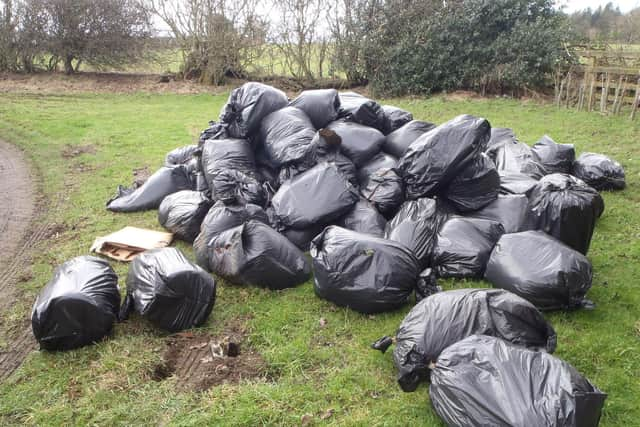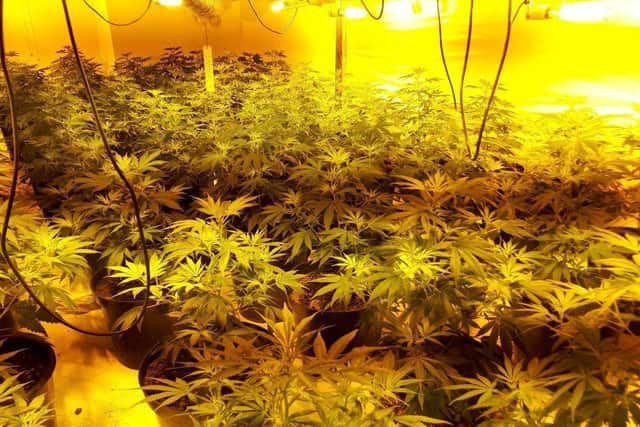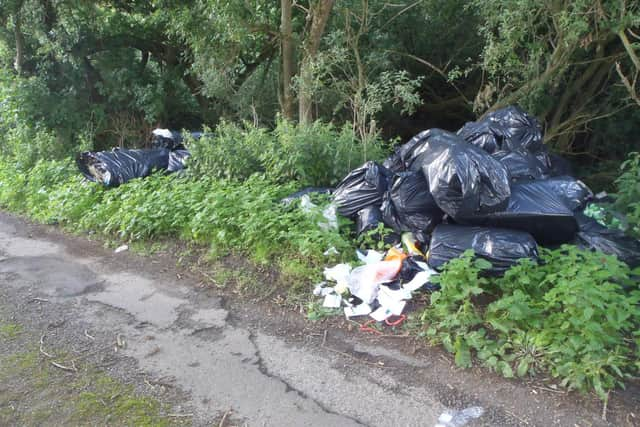Criminals running cannabis farms are fly-tipping their waste in rural farmland in North Yorkshire, say police
Dead cannabis plants, lamps, wiring and tubs of fertiliser are among the waste being found dumped on rural land, and the force says it is becoming an increasingly-common occurrence.
North Yorkshire Police have now been carrying out surveys to find out the true extent of the problem, with 10 of the 75 respondents reporting seeing cannabis farm waste dumped at least once a year. One landowner who responded said they had seen drug dealers' waste fly-tipped once every two months.
Advertisement
Hide AdAdvertisement
Hide AdIn one scenario, a farmer in North Yorkshire who had found bags of compost for growing cannabis on his land resorted to opening them up and spreading them on his land to avoid the waste.


A recent Freedom of Information request submitted by The Yorkshire Post revealed only 13 cannabis farms were attended and dismantled by North Yorkshire Police between January of 2017 and of this year, suggesting some of the fly-tipped waste is from criminals from surrounding areas.
The police force is now ramping up responses to catch criminals in the act and prevent further environmental and economic damage inflicted by the waste – with rural residents using WhatsApp groups to tip off police abut suspicious activity, while patrols are increased in the countryside.
Pc Gemma Mumby said: “Fly-tipping causes disruption to farmers and rural businesses, blights our countryside, and is hazardous to wildlife and public health.
Advertisement
Hide AdAdvertisement
Hide Ad“Criminals involved in cannabis production see fly-tipping as an easy way to dump their waste, so it’s only by working together that we can stop them.


“It’s really important that all incidents of fly-tipping are reported to the local authority. We work closely with councils, and forensic opportunities in cannabis waste could give us the chance to identify both fly-tippers and drug dealers.”
The impact can be huge on farmers and landowners, as councils will only pay to remove waste tipped on public land leaving private landowners to foot the bill themselves.
Police are also working with different local authorities as part of their response.
Advertisement
Hide AdAdvertisement
Hide AdHambleton District Council Leader, Coun Mark Robson, said: “The illegal dumping of cannabis farm and other waste across Hambleton is not only an unsightly blight on the landscape, it costs our council taxpayers tens of thousands of pounds a year.


“We work closely with North Yorkshire Police to provide evidence of farms and individuals, so that hopefully these criminals can be brought to justice.”
The CLA - an organisation joining rural land and business owners across the country - said fly-tippers need to be "named and shamed".
Its director for the North, Dorothy Fairburn, said: “The CLA would like to see more creative use of measures like naming and shaming, confiscation of vehicles and other property in addition to better education about the consequences of fly-tipping and littering.
Advertisement
Hide AdAdvertisement
Hide Ad“Our members have reported a big increase in fly-tipping on their land.
"Local authorities tend not to get involved with clearing incidences of fly-tipped waste from private land leaving the landowner to clean up and foot the bill, and if not, they risk prosecution for illegal storage of waste. This is simply not right or fair.”
“Farmers and landowners can go some way to preventing fly-tipped waste on their land by ensuring gates to fields are locked, opening up concealed entrances so they more visible to passersby, using CCTV in black spots and reporting all instances to the local police force.”
NFU North Riding & Durham County Adviser, Laurie Norris said: “We know fly-tipped material can be dangerous to human health and harmful to wildlife and livestock – so these latest reports about waste from illegal cannabis farms are alarming. We believe better communication between Government, local authorities, police forces and the Environment Agency will give those affected more confidence to report incidents that in turn will lead to greater investigation and prosecution.”
Support The Yorkshire Post and become a subscriber today.
Advertisement
Hide AdAdvertisement
Hide AdYour subscription will help us to continue to bring quality news to the people of Yorkshire. In return, you'll see fewer ads on site, get free access to our app and receive exclusive members-only offers.
So, please - if you can - pay for our work. Just £5 per month is the starting point. If you think that which we are trying to achieve is worth more, you can pay us what you think we are worth. By doing so, you will be investing in something that is becoming increasingly rare. Independent journalism that cares less about right and left and more about right and wrong. Journalism you can trust.
Thank you
James Mitchinson (Editor)